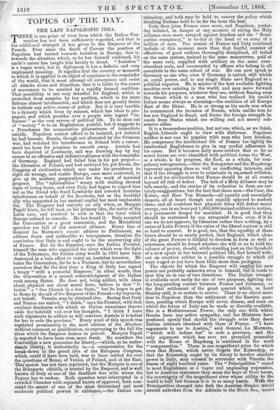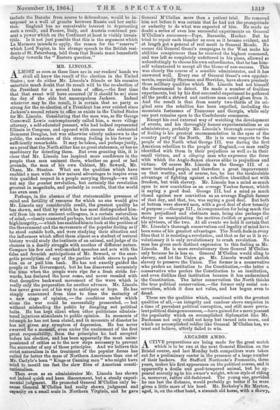TOPICS OF THE DAY
THE LAST NAPOLEONIC IDEA. stituency, and both may be held to convey the policy which thinking Italians hold to be for the hour the best.
Italy then joins France once more, and Napoleon, yester- day isolated, in danger at any moment of seeing the Holy Alliance once more arrayed against freedom and the "Bona- partist conspiracy," is to-day at the head of an army of a million of men. The armies of France and Italy combined include at this moment more than that fearful number of effectives, of good soldiers thoroughly disciplined, all levied on the same system, trained to the same manceavres, paid at the same rate, supplied with artillery on the same over- abundant scale and commanded by officers who belong in all essentials to the same school of war. He can now speak to tiermany as one who, even if Germany is united, still wields an equal power, and to any single State save England as a political superior. He is master of the best available fighting machine now existing in the world, and may move forward towards his purposes, whatever they are, without fearing even the threat which to a man who has realized his uncle's failure seems always so alarming—the coalition of all Europe East of the Rhine. He is as strong as his uncle was when he commenced the invasion of Russia, while unlike him he has not England to dread, and draws the foreign strength he needs from States which are willing and not merely sub- missive allies.
It is a tremendous position, but not one which, as we think, English Liberals ought to view with disfavour. Napoleon neither is nor 'can be popular with men who love freedom.
He compresses the intellectual life of France too tightly for intellectual Englishmen to give in any cordial adherence to his cause. But it becomes daily more evident that so far as moral forces are ever identified with political forms the West, as a whole, is for progress, the East, as a whole, for com- pulsory retrogression,—that the Bonapartes and the Hapsburgs represent opposing ideas as well as conflicting interests, and. that if the struggle is ever to culminate in ansarmed collision, it is well for civilization that France should be at all events beyond all risk of defeat. The talk of a Holy Alliance may be talk merely, and the stories of its reduction to form are cer- tainly exaggerations, but the fact that three men—the Czar, the Kaiser, and Herr Von Bismark—all equally and essentially despots, all at heart though not equally opposed to modern ideas, and all confidant that physical force will defeat moral energy, can in an hour put 1,600,000 trained soldiers in motion, is a permanent danger for mankind. It is good that they should be restrained by any antagonist force, even if it be one we do not approve, by Csesaiism rather than nothing, by a union of Latin Powers if the union of the liberal nations is still so hard to cement. It is good, too, that the equality of these forces should be so nearly perfect, that England, which alone of the great Powers is faithful to freedom in form as well as substance, should be forced whether she will or no to hold the balance of power, should, while standing just on the threshold of a new epoch in her internal political life, find herself with- out an exertion arbiter in a possible struggle to which all wars waged as yet have been little more than prologues. The objects for which the Emperor will employ his new power are probably unknown even to himself, but it tends to spur him on in one of two directions. The Italian strength is available most easily for one of two purposes, fighting out the long-pending contest between France and Germany, er the final settlement of the great quarrel which, as Lord Stanley said, is so certain to revive. There is no object more dear to Napoleon than the settlement of the Eastern ques- tion, pending which Europe will never disarm, and none on which the forces of Italy can be made so directly available. She is a Mediterranean Power, the only one with which Greeks have any active sympathy, and her Ministers have professed openly that should the struggle arise they deem Italian interests identical with those of France. "I have arguments to use to Austria," said General La Marmora, "which will induce her" to cede a province' and the only argument which has ever yet prevailed peaceably with the House of Hapsburg is contained in the word "compensation." There is one magnificent prize for which even that House, which never forgets the Kaisership, or that the Kaisership ought by its theory to involve absolute power in Italy, may consent to surrender with Venetia the dream of eight hundred years. The " Principalities " sound to most Englishmen as a vague and unpleasing expression, but to Austrian statesmen they mean the keys of their house, the sovereignty of the magnificent river whose utility to the world is half lost because it is in so many hands. With the Principalities changed into fiefs the Austrian Empire ,wbuld stretch unbroken from the Adriatic to the Black Sea, /would include the Danube from source to debouchure, would be in- terposed as a wall of granite between Russia and her ambi- tion. England has no conceivable interest in deprecating such a result, and France, Italy, and Austria combined pre- sent a power which on the Continent at least is visibly irresis- tible. Is it not just possible that this is the argument which La Marmora intends to apply, the reason for the "reserve" which Lord Napier, in his strange speech to the British resi- dents of St. Petersburg, told them that Russia must henceforth display towards the "Eastern question."































 Previous page
Previous page